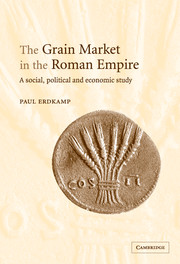Book contents
- Frontmatter
- Contents
- List of maps
- Acknowledgements
- Map 1 Asia Minor
- Map 2 Greece
- Map 3 Italy
- Map 4 The Roman World
- Map 5 Egypt
- Introduction
- 1 Production and productivity in Roman agriculture
- 2 The world of the smallholder
- 3 Farmers and their market relations
- 4 Market integration: connecting supply and demand
- 5 Rome and the corn provinces
- 6 Urban food supply and grain market intervention
- Conclusions
- References
- General index
- Index locorum
6 - Urban food supply and grain market intervention
Published online by Cambridge University Press: 04 November 2009
- Frontmatter
- Contents
- List of maps
- Acknowledgements
- Map 1 Asia Minor
- Map 2 Greece
- Map 3 Italy
- Map 4 The Roman World
- Map 5 Egypt
- Introduction
- 1 Production and productivity in Roman agriculture
- 2 The world of the smallholder
- 3 Farmers and their market relations
- 4 Market integration: connecting supply and demand
- 5 Rome and the corn provinces
- 6 Urban food supply and grain market intervention
- Conclusions
- References
- General index
- Index locorum
Summary
INTRODUCTION
The authorities and prominent citizens of the Roman world had no particular respect for the market. The modern idea that everything is best left to the forces of the market is the product of the liberal revolution of the late eighteenth and early nineteenth centuries. Hence, it was neither capital nor the market that wholly determined the economic relations within society. Social hierarchies and awareness of social position pervaded every aspect of society, including the food supply. Literary texts and inscriptions constantly imply or express in paternalistic language the duty of those in power to protect and take care of the needs of their subjects. The question remains, however, how far the responsibility of the central and municipal authorities was supposed to go, even from the viewpoint of ideology. Was the duty of rulers limited to times of crisis, or was food supply a constant concern of the authorities? How far did governmental responsibility concerning food supply – ideally and really – extend?
Most modern authors are sceptical regarding the interest of the authorities in the food supply of the common people. Those instances that seem to indicate otherwise are either explained as mere symbolic expressions of governmental responsibility, or as forms of euergetism that by their nature are unrelated to the workings of the market. Hence, they assume that the role of the government and of the local elites was inefficient or limited to occasional acts of beneficence towards a privileged few.
- Type
- Chapter
- Information
- The Grain Market in the Roman EmpireA Social, Political and Economic Study, pp. 258 - 316Publisher: Cambridge University PressPrint publication year: 2005
- 1
- Cited by



